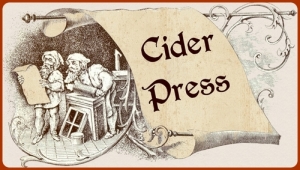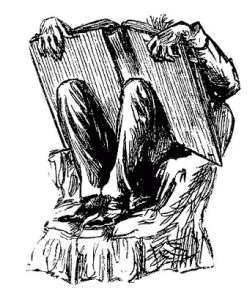Blind Tom
19th Century American "Savant" Genius Pianist

Mark Twain, wrote this about the musical genius
"Blind Tom":
One day last winter I was on my way from Galena to another Illinois town to fill a lecture engagement. I went into the smoking car and sat down to meditate; but it was not a good meditating place, for pretty soon a burly negro man on the opposite side of the car began to sway his body violently forward and back, and mimic with his mouth the hiss and clatter of the train, in the most savagely excited way. Every time he came forward I was sure he was going to brain himself on the seat-back in front of him, and every time he reversed I was as certain he was going to throw a back-somersault over his own seat. What a wild state he was in! Clattering, hissing, whistling, blowing off gauge cocks, ringing his bell, thundering over bridges with a row and a racket like everything going to pieces, whooping through tunnels, running over cows -- Heavens! I thought, will this devil never run his viewless express off the track and give us a rest? No, sir. For three dreadful hours he kept it up -- and you may know by that what muscles and what wind he had. His wild eyes were sightless. For the most part he kept his head turned sideways and upward as blind people usually do who get a dim ray of light from apparently above the eye somewhere. He kept his face constantly twisted and distorted out of all shape. When he spoke he talked excitedly to himself, in an idiotic way and
incoherently, but never slowed down on his imaginary express train to do it. He looked about thirty, was coarsely and slouchily dressed, and was as ungainly in build and uncomely of countenance as any half-civilized plantation slave. After I had endured his furious entertainment until I was becoming as crazy as he was and getting ready to start an opposition express on my own hook, I inquired who this barbarian was, and where he was bound for, and why he was not chained or throttled? They said it was Blind Tom, the celebrated pianist -- a harmless idiot to whom all sounds were music, and the imitation of them an unceasing delight. Even discord had a charm for his exquisite ear. Even the groaning and clattering and hissing of a railway train was harmony to him. And this stalwart brute was to torture his muscles all day with this terrific exercise, and then instead of lying down at night to die of exhaustion, was to sit behind a grand piano and bewitch a multitude with the pathos, the tenderness, the gaiety, the thunder, the brilliant and varied inspiration of his music!A month or two ago I attended his performances three nights in succession. If ever there was an inspired idiot this is the individual. He lorded it over the emotions of his audience like an autocrat. He swept them like a storm, with his battle-pieces; he lulled them to rest again with melodies as tender as those we hear in dreams; he gladdened them with others that rippled through the charmed air as happily and cheerily as the riot the linnets make in California woods; and now and then he threw in queer imitations of the tuning of discordant harps and fiddles, and the
groaning and wheezing of bag-pipes, that sent the rapt silence into tempests of laughter. And every time the audience applauded when a piece was finished, this happy innocent joined in and clapped his hands, too, and with vigorous emphasis. It was not from egotism, but because it is his natural instinct to imitate pretty much every sound he hears. When anybody else plays, the music so crazes him with delight that he can only find relief in uplifting a leg, depressing his head half way to the floor and jumping around on one foot so fast that it almost amounts to spinning -- and he claps his hands all the while, too. His head misses the piano about an inch or an inch and a half every time he comes around, but some astonishing instinct keeps him forever from hitting it. It must be instinct, because he cannot see, and he must surely grow too dizzy with his spinning to be able to measure distances and know where he is going to and whither he is drifting. And when the volunteer is done, Tom stops spinning, sits down and plays the piece over, exactly as the volunteer had played it, and puts in all the slips, mistakes, discords, corrections, and everything just where they occurred in the original performance! He will exactly reproduce the piece, no matter how fast it was played or how slow, or whether he ever heard it before or not. The second night that I attended, two musical professors sat down together and played a duet, which they had composed themselves beforehand for the occasion. It was wonderfully tangled and complicated, wonderfully fast in movement, and was bristling with false notes. In the midst of it "Yankee Doodle" was interpolated, but so mutilated with intentional discords that one could not help writhing in his seat when they rattled it off. The bass was a brilliant piece of complication, and fitted the composition about as well as it would have fitted any other tune -- just about. When the piece was finished, Tom stopped spinning and took the treble player's place alongside the bass performer, and clattered it furiously through, with his nose in the air, and never missed a note of any kind; and when he faithfully put in the ludicrous discords in "Yankee Doodle," the house came down. Then the treble man came back, and Tom took the wonderful bass and played it perfectly.
Tom will play two tunes and sing a third at the same time, and let the audience choose the keys he shall perform in. I heard him play "Fisher's Hornpipe" with his right hand in two sharps (D), and "Yankee Doodle" with his left in three flats (E flat), and sing "Tramp, tramp, tramp, the Boys are Marching," in the key of C -- all at the same time. It was a dreadful and disorganizing mixture of meaningless sounds, but you could easily discover that there was "no deception," as the magician's say, by taking up the tunes one at a time and following them a little while, and then you would perceive that in time, movement and melody, each was without fault.
But the most surprising thing this High-You Muck-a-Muck of all the negro minstrels does, is to analyze musical sounds. If you will turn your back to the piano and let somebody strike a key at random here and there, you will see that you cannot call the name of two of the notes in succession except by pure guess work; and when just one note is touched by itself you cannot tell whether it was a black key or a white one. Blind Tom is your superior, then, in some respects. For he can stand off at a distance, and face the audience, with his back to the piano, and you may strike any key you please, and he will tell its name and its color; and two persons from the audience may select twenty keys (mixed so as to form a discord that will give you the lockjaw), and strike them suddenly and all at once, with their four hands -- and while the sound lingers in the air, the listening idiot will incline his head and make a fine assay of that sound, separate the web of discord into its individual elements, and then begin with the first note and rapidly call the name of every key of the twenty in succession, and never make a mistake! And twenty more may be struck, and the fingers of the performers instantly sent scattering at random over the full compass of the piano -- but by the time the flash of sound had died Thomas has analyzed it and can name the notes that made it. All the schooling of a life-time could not teach a man to do this wonderful thing, I suppose -- but this blind, uninstructed idiot of nineteen does it without any trouble. Some archangel, cast out of upper Heaven like another Satan, inhabits this coarse casket; and he comforts himself and makes his prison beautiful with thoughts and dreams and memories of another time and another existence that fire this dull clod with impulses and inspirations it no more comprehends than does the stupid worm the stirring of the spirit within her of the gorgeous captive whose wings she fetters and whose flight she stays. It is not Blind Tom that does these wonderful things and plays this wonderful music -- it is the other party.
We have the following pieces of sheet music by Blind Tom:Voice Of The Waves
Wilt Thou Bring My Baby Home? (song)
Oliver Gallop
When This Cruel War Is Over
The Rainstorm
Daylight
The Battle Of Manassus
March TimpaniWe also have prepared 2 PDF files with information about Blind Tom:
A 19th Century magazine article. and a short old book entitled "The Marvelous Musical Prodigy - Blind Tom"
Downloading
We have prepared the Blind Tom downloads as PDF files containing scans of the original sheet music and publications. These PDF files can be eaily printed on any standard printer
.
You can make a secure payment using a credit-card of Paypal at the link below.
After your payment is processed you will be immediately emailed the download link.Download the Blind Tom sheet music
Credit-card or Paypal - $5.00
Early American music,
unusual & unique music,
and ephemera collection.
Visit the Cider Press
Home Page
The Cider Press Unique PDF ebook collection for historical researchers, music history researchers and for the just plain curious folks out there....
including the music of the spheres, the music of a Renaissance alchemist, music created by software and artificial intelligence, the music of the fairies, the music of the Illuminati, the world's most mysterious book, the world's oldest song, a way you can compose music like Mozart, the world's oldest love song,
and much more........




